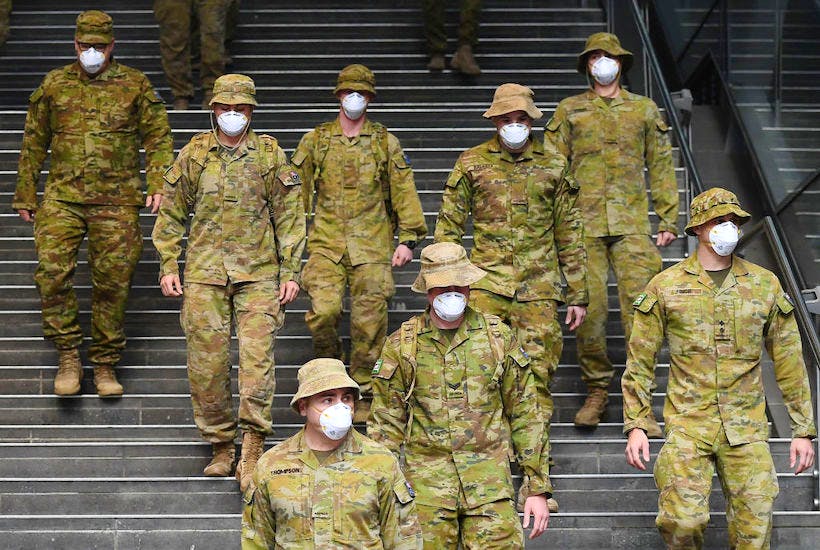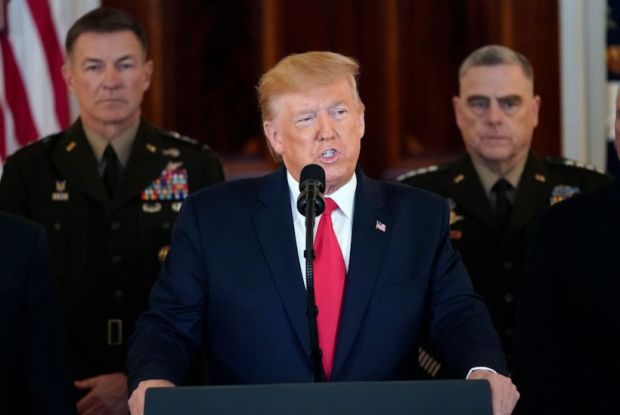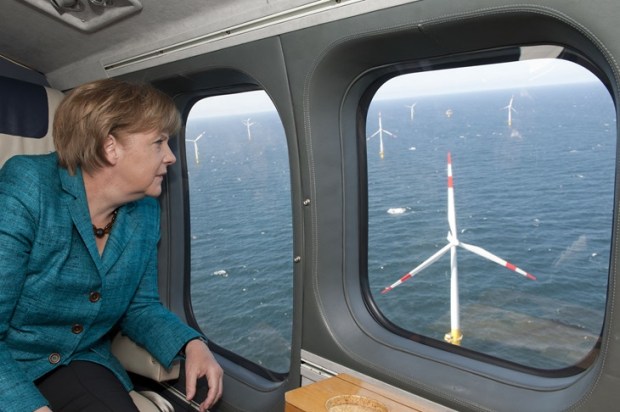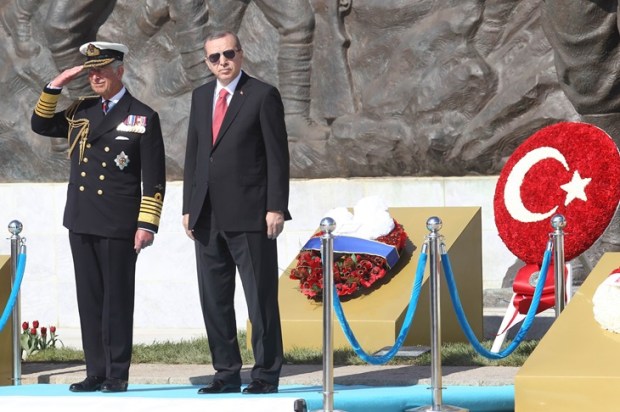From this morning 300 Australian Defence Force personnel will be deployed on Sydney’s streets after a weekend’s worth of training and without publicly available orders.
While the pandemic in some ways inures us to the unprecedented and unexpected, such a deployment of military power in our domestic midst should raise some questions.
So, let’s start with the most basic one. Given that militaries are about missions, what is the ADF’s mission here?
On Friday morning, the Sydney Morning Herald reported that, according to New South Wales government representatives, the mission is “to help Police crackdown on residents flouting stay-at-home restrictions amid rising case numbers.” On the Today Show that morning, NSW Police Minister David Elliott appeared to confirm this by describing the deployment as: “supporting Police in operations and sending an important message to the community to ensure compliance.”
Elliott also stated that the deployment was about “more productivity from the Police” and “now that we have the further support from the ADF, the message is quite clear: don’t go out.” Police Commissioner Mick Fuller added that the deployment was about boosting the “operational footprint” of NSW Police.
Media reports also indicated that the deployment may include: pairing soldiers with NSW Police officers in conducting patrols (while not carrying weapons), and; conducting door-to-door checks at residences in the eight fully locked down local government areas. (Fuller was less supportive of door-to-door checks in his media appearance.)
In commenting on the deployment on Friday, the Prime Minister took a softer line, but still very clearly left command authority with the Police Commissioner:
Operation COVID Assist is there to support the efforts of the NSW government right across the city and where they’re deployed. That is being done under the direction, I should stress, of the NSW Police Commissioner, Mick Fuller, and the ADF are working under their command.
I want to be very clear about this: ADF personnel are there to support authorised law enforcement officers in New South Wales, the sworn officers and those who are in New South Wales. The ADF are there to support and assist, as they successfully did during the lockdown in Victoria over many months last year doing many tasks from driving vehicles to supporting logistics to assisting communities by checking on the welfare of people, checking in on people’s isolation. They fulfil a vast array of tasks and New South Wales will get as much ADF assistance as they request.
Sounds like different briefs, right? Indeed, it’s difficult to be clear if the ADF is patrolling with Police, or providing some forms of logistical support, or acting as welfare officers, or being Uber drivers. You’d think there would an agreement somewhere that clears things up? As indicated by Elliott on Friday before the weekend training and Monday deployment, administrative orders to guide the operation would be “drafted in the next couple of days”.
So while the scope of ADF activity is at best vague, let’s look at the workability of the possible mission as presented by Elliott and his Commissioner, who the PM says are in charge.
First and foremost, there is the legal position. Posse comitatus notwithstanding, the ADF has no legal powers to arrest civilians or issue fines to civilians. So, very simply, the rationale that the ADF is to assist with actual enforcement of compliance seems, well, illogical.
Secondly, there is the matter of capability. Unless the ADF personnel are drawn specifically from Military Police, they will have had no training in law enforcement. If they are in fact drawn from MP units, it is unlikely they will have had substantial experience involving a civilian population.
Moreover, the civilian population in question across Sydney’s locked down LGAs is one of the most complex in Australia:
- It’s comparatively lower socio-economic composition and job types make it particularly vulnerable to the emotional and financial stresses of lockdown.
- Before to COVID and related to the high number of migrants and refugees in that population, it already had the highest mental health presentation rates in the country.
- A significant number of the population come from actual war zones and are more predisposed to bear those traumas and related associations with military personnel.
- It has the greatest percentage of culturally and linguistically diverse — CALP — residents of anywhere in NSW and arguably Australia.
All of the above also makes the west and southwest of Sydney home to very resilient types. Nevertheless, it is a highly complex civilian context with specific characteristics and we are asking soldiers to be part of a “crackdown” (according, again, to government representatives) with two days’ worth of training for a murky mission. (NSW Police, on the other hand, receive extensive training and have very strong protocols about, for example, dealing with individuals with emotional disturbance and mental health issues.)
Thirdly, there is the question of resource requirements. We are publicly told that the deployment is necessary because the NSW Police need the extra resources. However, if there’s a need for broader operational coverage, it makes little sense that the ADF will actually be patrolling in tandem with Police. That does not provide actual force multiplication or geographical reach. Rather, it looks to be duplication and inefficiency. Why send four guys – in two different sets of uniforms – to do the same job? The scenario is of course different if the military is not patrolling, but say “driving” as the PM wishes, but we don’t know that yet.
Personally, as an ex-serviceman, I feel bad for the ADF troops who are being put into an ambiguous mission where they are probably not the right legal, operational and, indeed, emotional fit.
While the ADF will of course act with utmost professionalism and courtesy, there are identifiable emotional and mental health risks. My fear is that the ADF presence in a traumatised community –- even if they are not “patrolling” but just present while undertaking various “logistical” tasks — may do more unintentional harm than specific good. That in turn could be counterproductive to compliance with public health orders.
It’s unlikely that a poorly designed mission without the right capability will be directly contributory in real terms of reducing case numbers – and it is likely to have its own costs. We will (with great anxiety) wait and see what happens in the area’s Emergency Departments in the coming weeks in addition to COVID-related presentations.
As with any proposed or pending action, it’s therefore good to ask question: cui bono; who benefits? Who stands to gain from the deployment of the ADF in southwest Sydney and its promotion in the media?
Well, and let’s put a fine point on it, both the Commonwealth and NSW governments stand to gain in perception terms. Uniforms are good television. Colour and movement are the spin doctors’ solution when the policy guys’ solution may not be working. Governments know that stability is a critical electoral attribute. There are few better ways to convey “control” than military involvement and all the iconic aspects of it – for viewers at home, that is, rather than locals living the reality.
Indeed, it’s credible to suggest that ADF troops are being sent into the street for symbolic and political reasons rather than legitimate logistical ones associated with compliance with public health orders. And, those symbolic reasons are not pretty, I believe. They can be seen to be mostly about projecting the state’s power and further leveraging community fear — and that is very ugly. And, it’s heartbreaking that it’s being done by Liberals.
Let’s go back to the quote from the Police Minister’s public desire about “sending an important message to the community to ensure compliance.”
At both the national and state levels, some in Liberal leadership teams seem quite comfortable -– if not eager in the case of Elliott, who should know better given his military service -– to cross a historical line, to blur an important institutional distinction between the military and the Police, and to seemingly compete with each other in limiting liberty in the name of some other principle.
The greatest Liberal campaigner of all time and a man with extraordinary insights into how publics think and politics works, Mark Textor, currently conducts a lonely online vigil about pandemic policy overreach. It’s downright bizarre that, in the current context, Tex seems almost Quixotic.
I struggle to remember the last time I heard a leading current Liberal policymaker publicly express concern about the implications of lockdown policies in terms of future governments’ role. Quite the contrary, the pandemic seems to be providing a pretext for some who may wish to rule with impunity. With what appears to absolutely zero self-awareness, one anonymous NSW Minister last week told the press that the government needed to consider “opening the beer gardens” to incentivise vaccinations.
But let me end with a mea culpa. Throughout my time in Liberal politics –- and in no way do I overestimate the importance of my roles or my influence on events -– I and my generation of political peers counselled pragmatism over orthodoxy and ideology. It was better for winning; it was better for chasing swing votes; it combatted Labor’s “whatever it takes” mentality. In moments of greater equanimity, we also argued that it was also more in line with community expectations.
The problem is that pragmatism –- or call it expediency -– has become the default position. Principles are also a victim of the pandemic.
So, when I see the first troops down my street here in western Sydney as I may, I will know it’s partly my own damned fault and, as the lockdown and deployment’s further consequences come to bear in western Sydney, I can only apologise.
Pete Shmigel writes, coaches, advocates for mental health, and serves on boards — after surviving three CEO gigs and professional politics
Got something to add? Join the discussion and comment below.
Get 10 issues for just $10
Subscribe to The Spectator Australia today for the next 10 magazine issues, plus full online access, for just $10.


























Comments
Don't miss out
Join the conversation with other Spectator Australia readers. Subscribe to leave a comment.
SUBSCRIBEAlready a subscriber? Log in